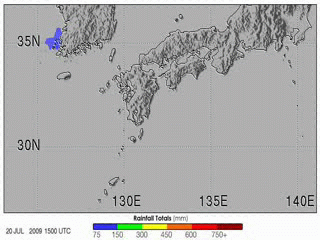South Korea's Torrential Rains Claim 18 Lives Amid Heatwave Warnings

Torrential rains that began on July 16, 2025, have devastated large portions of South Korea, resulting in the deaths of at least 18 individuals and leaving nine others unaccounted for, according to the country's Ministry of the Interior and Safety. The deluge, which lasted for five days, triggered flash floods and landslides, particularly impacting central and southern regions of the country. Reports indicate that the military has mobilized approximately 2,500 personnel to assist in recovery efforts across the worst-hit areas.
The rainfall has been described as some of the heaviest on record, with hourly precipitation levels reaching alarming highs. In the southern county of Sancheong, 10 fatalities have been reported, with additional individuals missing. One resident in the town of Gapyeong died when a house collapsed due to the relentless downpours, while a man who was camping near a stream was swept away by the swift currents. The JoongAng Daily reported that the man's wife and son are also currently missing, highlighting the tragic human toll of the severe weather.
As of now, approximately 14,166 residents have been evacuated from their homes across 15 cities and provinces, with extensive property damage reported. The South Korean military is focusing its recovery efforts on repairing homes and public facilities affected by the flooding. This response follows the recording of nearly 2,000 incidents of damage to public infrastructure and over 2,200 cases involving private residences and buildings, as reported by Yonhap news agency.
Hannah June Kim, an associate professor at the Graduate School of International Studies at Sogang University, expressed concern over the lack of preparedness for such extreme weather events. "A lot of people were taken off guard because monsoonal rains came later than expected this year. The expectation was that monsoons would not be appearing during this summer," she stated. This sentiment is echoed by many in the scientific community who attribute the increasing frequency and intensity of extreme weather events to climate change.
In light of the ongoing crisis, South Korea's Meteorological Administration (KMA) has lifted heavy rain advisories but cautions that a heatwave is expected to follow. Forecasts predict morning temperatures between 23 and 26 degrees Celsius (73.4°F to 78.8°F) and daytime highs ranging from 30 to 35 degrees Celsius (86°F to 95°F), significantly above seasonal averages. Warnings for heatwaves have already been issued for parts of South Jeolla, the east coast of Gangwon, and Jeju Island.
The implications of this disaster extend beyond immediate humanitarian concerns. As scientists have increasingly pointed out, climate change is exacerbating the severity of weather patterns globally. In 2022, South Korea experienced unprecedented rainfall that resulted in the deaths of at least 11 people, with the government attributing the extreme weather to climate change. This pattern of intensified rainfall and subsequent flooding threatens to become a recurring challenge for South Korea, necessitating a reevaluation of preparedness and response strategies to mitigate future disasters.
Advertisement
Tags
Advertisement




